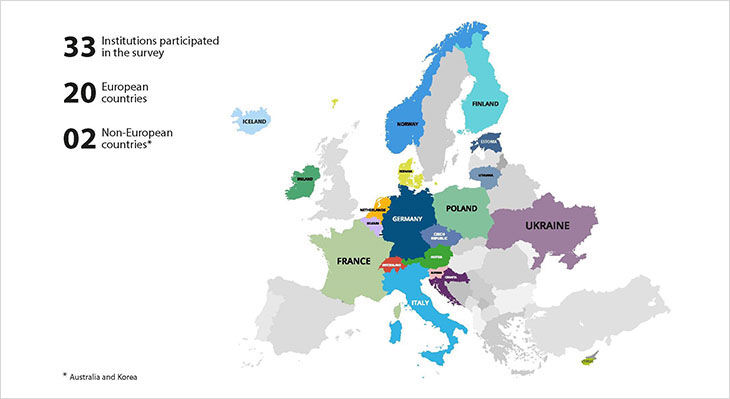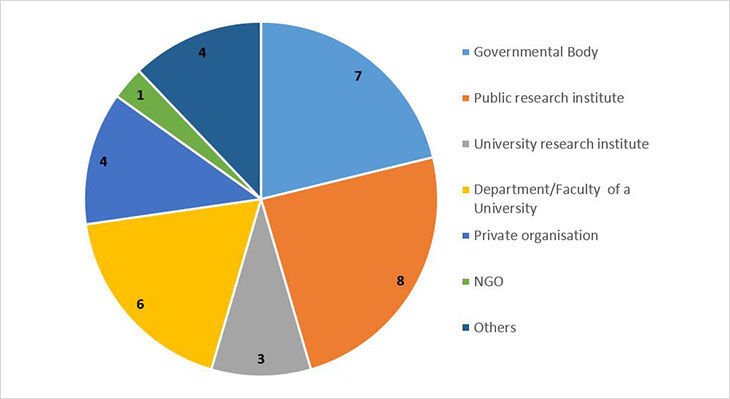International conference on VET research
30 high-ranking representatives of national VET institutes and research facilities from 14 European countries met at a virtual conference at the invitation of the Federal Institute for Vocational Education and Training (BIBB) to exchange views on VET research in Europe and in its international environment.

Survey of national institutes
In order to identify the common challenges, the first step was to survey the institutions and agencies on their organisation, thematic priorities and working methods as well as their strategic embedding in the country-specific discussions on the further development of VET.
In a kind of snowball procedure, 71 institutions from 35 countries were contacted from August 2020 onwards. The first results of the survey, which is still ongoing, were presented at the virtual conference. The responses received from 33 institutions from 20 countries were analysed.
VET research has a long tradition
Some of the VET research institutes have a very long tradition. In the 1950s, the first specialized institutions were set up in today's European member states. The earliest example is one of the predecessor institutes of today's National Pedagogical Institute of the Czech Republic, which was founded in 1953. Like the BIBB, the French institute, Center des études et des recherches und sur les qualifications (Céreq), can look back on 50 years of existence this year. In two years, the Italian VET institute (ISFOL), which has been part of the Istituto Nazionale per l'Analisi delle Politiche Pubbliche (INAPP) since 2016, can point to fifty years of experience in VET research.
The interim results of the survey show the change in the institutional structure of VET research.
While a number of state institutes were founded in the 1970s, the landscape today is characterized by a great variety of institutions. In addition to public research institutes and authorities, universities and privately run institutes also perform tasks in national VET research.

VET research requires collaboration between different disciplines
A total of around 7,000 employees contribute their specialist knowledge to the development of vocational education and training. The majority of the academic staff comes from the field of education and sociology, followed by the fields of psychology and economics. The range of topics dealt with by the institutes is broad: on the one hand, questions relating to the organization of the VET system are examined and structures of its order are further developed, on the other hand, questions relating to the organization of teaching and learning processes and the training of vocational training staff.
In addition, a broad spectrum of topics was identified in which all institutes are equally interested, such as the importance of digitization for vocational education and training.
Conclusion of the event
With a great deal of commitment from the participants and based on the interim results of the survey, workshops were held about the content and formats of cooperation, the challenges for VET research and communication between science, politics and VET practice in order to jointly explore perspectives for cooperation in VET research.
"Many issues in VET research are very similar in Europe and transnational," emphasized BIBB Director of Researcb Prof. Dr. Hubert Ertl. “For example, the questions about the effects of the Covid-19 pandemic on vocational education and training and digitization on the world of work are very topical. By forming a network, we will be able to bundle research capacities, improve the exchange of information between the individual VET institutions in Europe and learn from each other."
All those involved agreed that by strengthening VET research in Europe, consolidating the cooperation between institutes and facilities as well as establishing a corresponding network, an active contribution to sustainable vocational education and training in Europe can be made. The discussion on European cooperation in VET research is to be continued in further events within the framework of the German EU Council Presidency. For example, together with the European Research Network on Vocational Education and Training (VETNET) and the European Commission, BIBB is organizing a workshop as part of the European Vocational Skills Week, which will take place from November 9th to 13th, 2020.